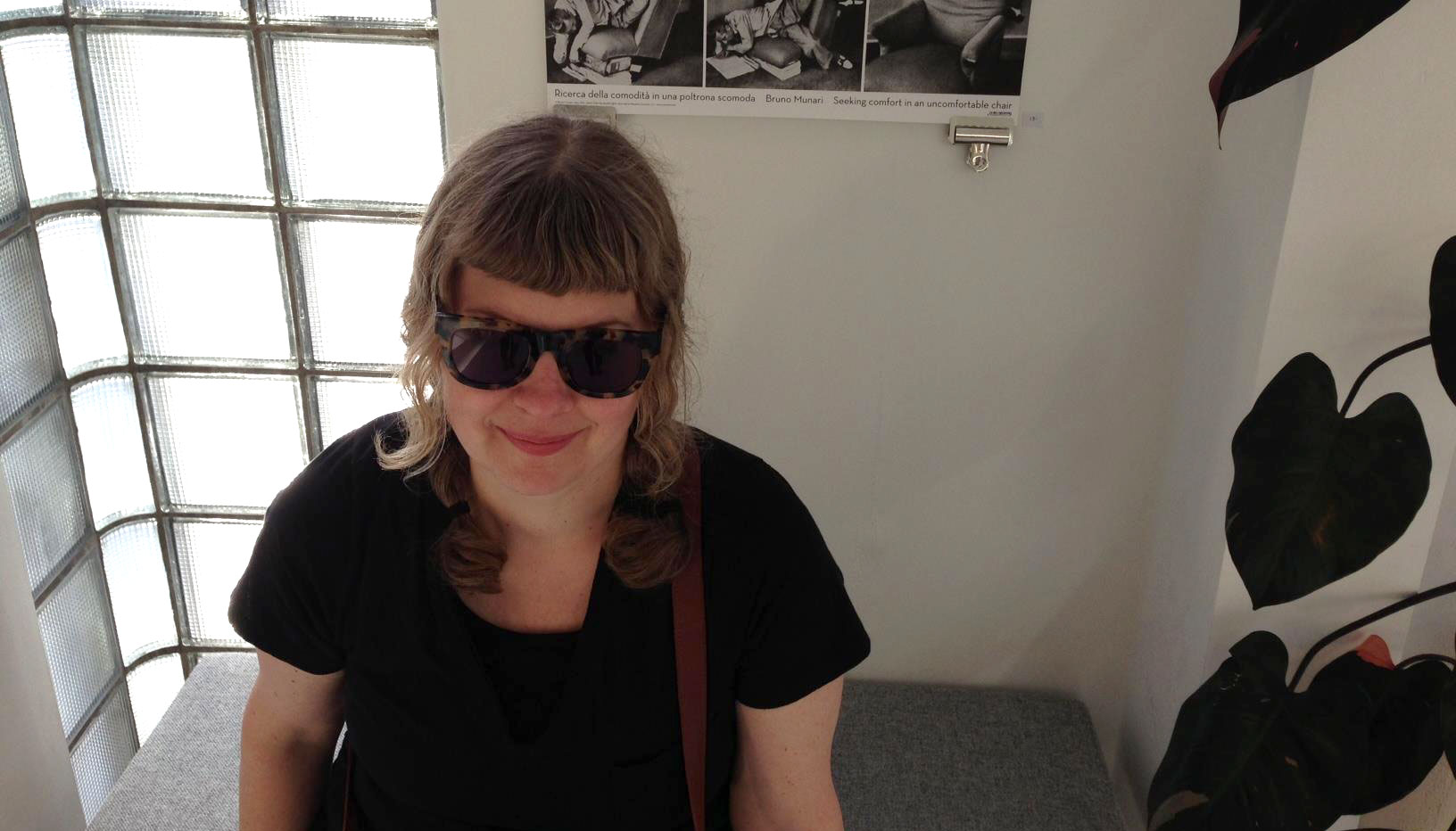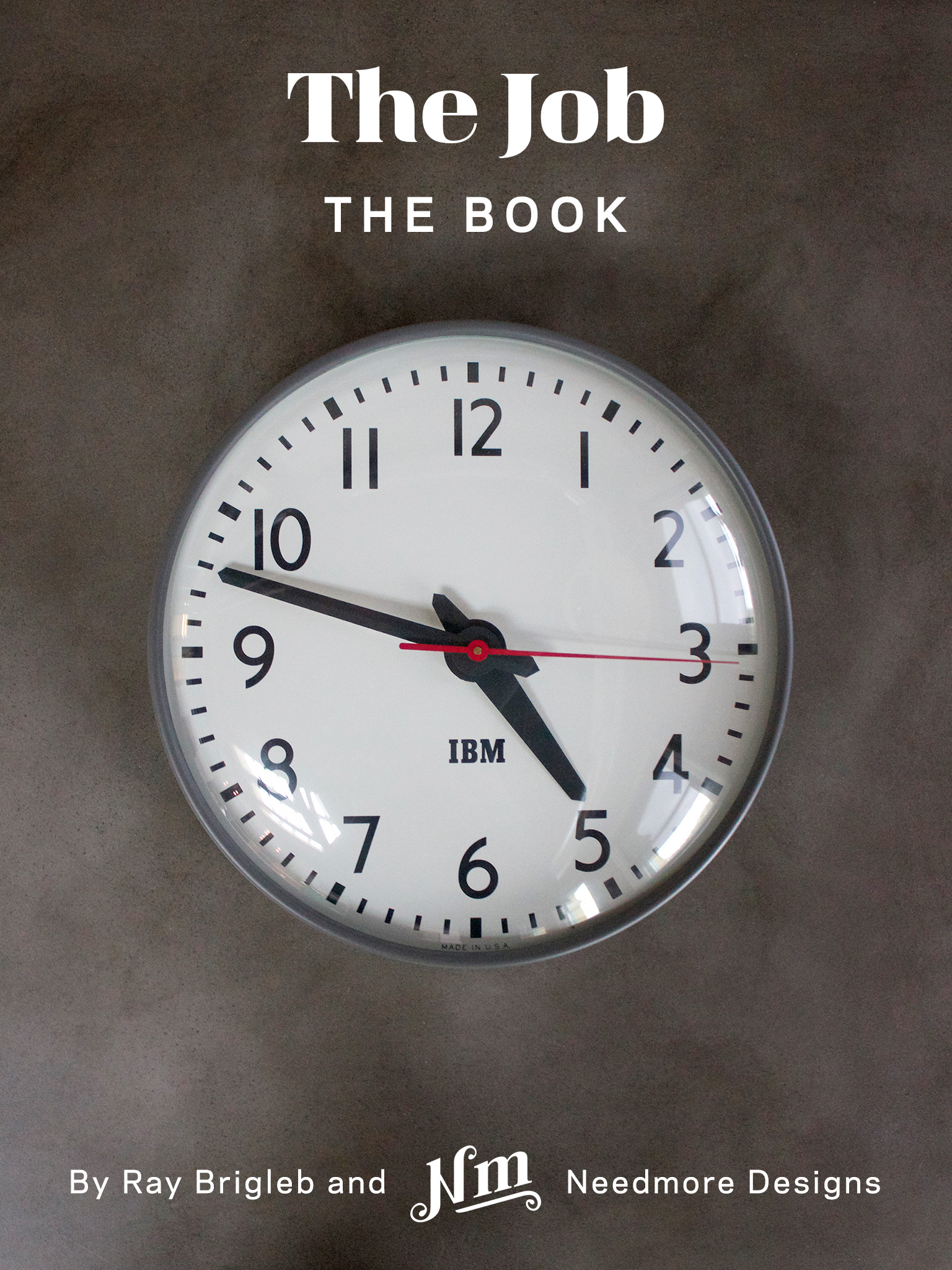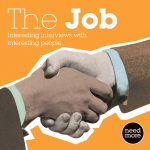
Gail O’Hara is a writer, photographer, co-founder of chickfactor, and managing editor of Kinfolk.
The Interview
- Ray:
- So, I don’t know if … I’m talking to Gail, there will be an intro before this, and I might just leave this part in, I don’t know.
- Gail:
- You’re not videotaping, just …
- No, no video, no, no, no. No one will see the liter and a half size bourbon on the table. Where are you from? Let’s start there.
- I grew up in … I was born in Washington, DC; grew up in the suburbs outside of DC in Virginia. My … it’s a really cute, phoo nautical community called Lake Barcroft, and not far from some hardcore bands that came out in those days called … like Scream and 9353, and there was some bands that went to my high school and stuff. Generally a really pretty place to grow up and I thought it was really boring, but it wasn’t really.
- We always do, yeah.
- Anyway, that’s where I’m from.
- Did you spend much time on the East Coast? It seems like you …
- Yeah, that’s where I’m from, so I went to college in Richmond, Virginia; I lived in New York City … Well I lived in Washington after college for a bit, and then I lived in New York City for a long time, and then I lived in London for awhile, and then I lived, came back and lived in North Carolina briefly and then I came here.
- Okay. Now, did you have … I looked at a lot of your photography, and it’s really good, did you have a formal training in that? Was that part of college?
- I took one class in college of … I guess we did darkroom stuff and it was just black and white. Then I took another class while I was living in London to learn to develop color, but I don’t really do it, I don’t practice it, I just … it was interesting to learn, and I was like, “Wow, I’m blind as a bat in here, it’s so dark.” Good thing I have good people to, I don’t know, it was interesting because it was like, “Wow, this is really time-consuming.” I wish I could do it, I wish I could just join Newspace and go there all the time, but I don’t know, it’s just, it never seems to happen.
- Yeah, took one course …
- Yeah, I’ve been lucky because I think it was when I discovered that I was using the wrong film and I was not getting my film developed in the right place, that I became a good photographer, because I found those things. I feel there’s, for the few people that still use film, there’s always hope for that because if you’re just using, if you don’t know what you’re doing … In those days they would just run black and white through some color machine probably or whatever. Anyway, but yeah, thanks.
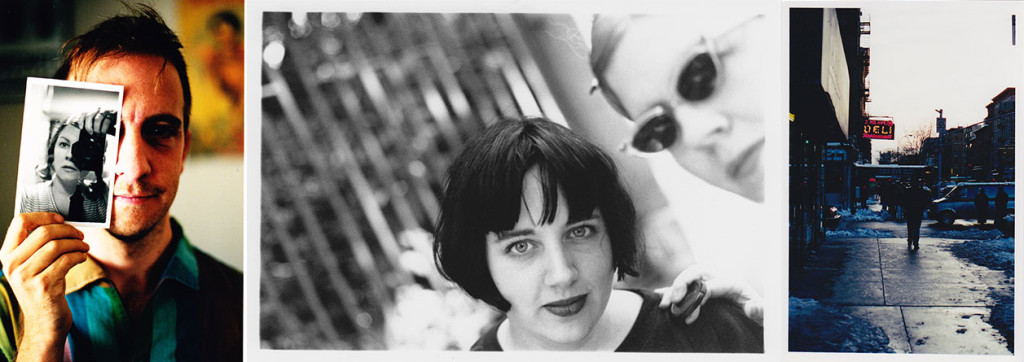
Some of Gail’s photography
- When you were … At what point … Where were you when you stared ‘chickfactor’?
- I had just moved to New York City from Washington, DC. Pam Berry, who I started it with, who is a singer and we were best friends, she and I … it was a thing we did to hang out. I would go back to DC, we both had worked out an office at the Washington City Paper, which was a great alternative newsweekly in those days. It’s still there, I don’t, I’m not really, I don’t see it that much so I don’t know how it is.
- We’ll give it the benefit of the doubt, for those in DC.
- Yeah, so Pam … It was Pam and I did, it was just a lot of fun. You know how you work on a creative project and you just get lost, and all of a sudden it’s eight AM and you’re totally zombified? It was really, really fun. A lot of our friends contributed, and they were people in bands a lot of them, writing about music, and a lot of guys were writing under girls’ names, that was a big thing. Eric would be Erica and Chris would be Christa, so there was a lot of our friends contributing. Definitely very much people from the Slumber Land scene in DC and probably other bands that we knew. I was living in New York she was living in DC, but that’s where we were when it started.
- Was there a theme, in terms of genres that you were writing about or something?
- I would say that what we were generally into was British pop music, and a lot of it wasn’t really widely available over here. At that time there was no internet, so we were providing a service to, if there were 20 other people who liked the music we liked that they would find out about it. I guess there was an aesthetic of pretty pop music with guitars or noisy pretty pop music with guitars, a lot of stuff like … we were into the Wedding Present really heavily at that time, all the Slumber Land type bands were our friends, and probably My Bloody Valentine. Everything that came out of anything from the Smith’s to the Jesus and Mary Chain and The Cocteau Twins, and everything that was happening after that.
Then I would say Pam was much more of a pure Indipop girl, and I was much more … I was living in New York and I was probably learning about, I was influenced by bands that I was going to see, bands like Liz Phair or something like that. Something like that I think Pam probably didn’t approve of that, but I was … so, whatever. We both have really varied taste, and there’s … Something like Serge Gainsbourg, like you mentioned, would be in ‘chickfactor’ along with a reissue of some 60’s bubblegum bands. Just, I feel it was, it’s always been characterized as a twee thing, but it’s more general than that. It definitely has an aesthetic for the quieter side, but not always. We definitely like some loud music too.
- Is this … It seems like you did this for, in print, at least 10 years. Is it about 10 years?
- Yeah, 10, yeah.
- Did you feel there was a trajectory? When you started, like you said, there was no internet.
- Yeah, it changed a lot because of the internet, but also I … In 95′ Pam left, and then I went to work, I had been working at ‘Spin’ and I went to work at ‘Timeout New York’, where I was the music editor. A lot of my ideas and energy was channeled into ‘Timeout New York’, so actually if you look back at issues from, not that you can, but issues from the late 90’s and ‘Timeout New York’, we have jukebox jurys and silly reviews and all kinds of ‘chickfactor’ type stuff in ‘Timeout New York’. A lot of the same people that probably would’ve been writing for ‘chickfactor’ during that time, like Stephin Merritt or Franklin Bruno or Douglas … all these people ended up writing for ‘Timeout New Yor3k.’ There’s a lot more musician type writers I guess.
- You had an association with Stephin Merritt, and it seems like you ended up doing Strange Powers is that the name of the, a documentary. How did that come about?
- Stephin, we became friends in probably 94′, 95′ when he moved to, he had just moved to New York. Claudia had pushed me to give him a job as an editor, a copy editor at ‘Spin’ where I was the copy chief, so hired him to work there. Then he came with me to ‘Timeout’ when I went there, and we both were just writing and editing and doing whatever we could do to get by or whatever. He wasn’t rich, wasn’t living off royalties yet. Yeah, it was a lot of fun. I would say a lot of our time in the mid-90’s, we would just walk around New York City taking pictures for fun. Sometimes it would be like, he liked a picture so it would end up on a record or something. My photos are here and there with their … All of his bands I’ve been somehow involved with either covers or promo photos or whatever.
Yeah, it was a lot of fun, we were friends and friends with Claudia too. Then I was just a friend and nerd fan that would travel around with them and go to shows out of town. At some point I just decided, I think it was right before 69 Love Songs came out, I thought I’ll buy some little video camera and start shooting, so I did that. I was pretty bad at it, I didn’t have any training and it was just shaky, wobbly footage. A couple other friends of mine helped shoot things in those days, and then Kerthy Fix, who’s the other person who was co-director and co-producer, she’s the one who probably orchestrated a lot of the more professorial shooting that went into the film. The two of us worked on it, it dragged on for years, probably I would say at least 10 years or something. We had footage from 1999 until it came out in 2010.
- Oh wow, okay. You were wobbly before it was cool I think, probably.
Yeah, I can call myself a photographer, but I’m not really technologically savvy about cameras. I’m not ashamed of it, I feel like, well I like the photos that I take and they don’t really fit into a lot of the current vibe, but I like the smudgy blurry quality that they have.
- You’re in New York City, and I don’t know if you were working with ‘Spin’ or ‘Timeout’ but then at what point did you decide to move to London and why?
- Well I had been in New York for 11 years, and I was, to be honest, I got, I wasn’t in New York during 9/11, but I was effected by it in a bad way. I think it gave me PTSD for awhile. I was living in a high-rise, and I just, there was an earthquake right after it happened. I was just, I don’t know … so I went to London, no, I don’t know. I was there during some terror attacks as well. Anyway, but I … my, Pam from ‘chickfactor’ went to move to London in 98′ and she’s married and has two little kids. Ever since she moved there I’ve gone there on vacation over and over and over again, and I have a lot of friends over there.
It just felt like the right thing to do, so I applied, at the time I was writing a column for ‘The London Times’ so I applied for a visa and I got it. I was able to get a really great visa and go live there and just have any job I wanted and everything. I feel really, really luck; thank you to Lindsey, my immigration attorney. It was really fun, and I have a lot of family over there too. It was just a thing, I felt it was just the right time to leave New York. I had a rent controlled department in New York and it was just like, “Okay, can’t live here forever.”
- Right, that’s tough.
- Then I gave it up for good in 2005.
- How did you get involved in writing for ‘The London Times’ did you say?
- They just emailed me one day and said, “Do you want your own column?”
- Were you writing about music?
- I had left “Timeout New York’ in 2000 and this was early 2003, or … is that right? Yeah, so I think it had something to do with Bob Stanley from Saint Etienne. He was a friend and he had just written something about zines and the times or the guardian or something ad called ‘chickfactor’ the best zine or just something like that. I’m sure the people were like, “Bob Stanley thinks this person is …” I don’t know, but yes, so they called me and offered me a job and it was weird because I was cashing Rupert Murdoch checks.
Anyway, but it was fun for awhile, and I was writing about American music. It … I had gotten really burned out on writing about music at ‘Timeout’ and it almost felt like my relationship with music had been jeopardize or something, it was just too much, it was just too much. ‘chickfactor’ had been my thing and then ‘Timeout’ … it was just too much.
- Yeah, just like you were writing about British music and then you moved there and wrote about American music.
- No, no, I was doing it before I moved there.
- Okay, I see.
- If I hadn’t told them I moved there I probably would have kept doing it, but I think they wanted someone in the US doing it.
- Oh, I see.
- Anyway, but it fun while it lasted.
- Authenticity.
- I know right. Yeah, it was really fun to … they were just like, “Do whatever you want.” I was like, “Okay, let’s …” I, really I feel somewhat responsible for Devendra Banhart’s career, because I was probably the first person to write some big thing. They had a huge picture of him in the ‘London Times’ and I’m sure it helped his career; just because his record was selling like hotcakes then other music at the time. Anyway …
- How do you get from, in your story, how do you get from London to Portland? It’s quite a trip.
- They’re very much alike.
- Are they?
- No.
- I’ve been to London.
- Weather wise, yes. I don’t know, they’re not … I love London dearly, I would probably still be there now, but I had some issues with my visa program in 2007 and then I came back that same year and spent a little time just traveling around while we finished the film about Stephin Merritt and The Magnetic Fields. Then I went … I had already been thinking about where to live in the US when I came back, and Portland was on my radar for quite awhile. I came here multiple times, and then when I … I think I came out here in 2009 expressly to look for work. I found a couple, I’ve had a couple of jobs before the one I have now. I wouldn’t say it’s an easy place for me to be career wise, but it’s definitely the right place for me in a lot of ways. I’ve been here for like five years.
- Yeah, yeah. The job you did end up with is managing editor at ‘Kinfolk’. Tell me how that came about how that’s going.Obviously you’re not going to say anything bad because you work there.
- ‘Kinfolk’ is … it started in 2011, and they were advertising for some sort of editor in late 2012. I applied for it just because I was like, “I want to get a … I want to see what this thing is about.” I didn’t get that job, I think it was more of a recipe editing job or something, but I kept in touch with the editor and he was very thoughtful and wrote me a really long response, like, “Let’s keep in touch, we might be hiring more people.” That sort of thing. I’m all about keeping that thing open if someone is like, “Maybe it will work out later.” I’ve gotten other jobs that way just by like sending a postcard or something.
Yeah, I’ve been working there now for … I started there in March of 2013, so … Yeah, they had just done a reader’s survey and they really wanted to respond to whatever issues people had with the magazine at the time. That’s one of the reasons they hired me I think, and they’ve also hired another editor since then. We have a very small team working on the magazine, but I feel it’s changed a lot over the past year, and it’s still changing all the time. It’s really fast-growing and fast-moving place to work. There’s a lot going on and no one knows what tomorrow .. It just seems, it seems like it’s … I feel like I’ve worked there for five years; it’s crazy.
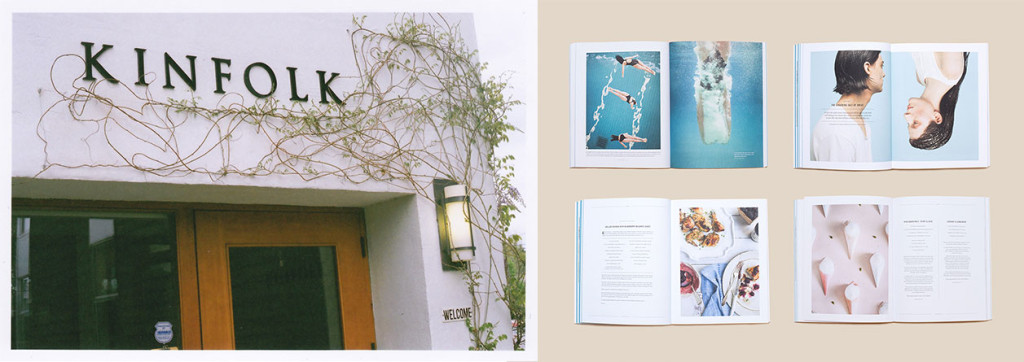
Kinfolk office and a few spreads from the Saltwater issue.
- Yeah, I was on the website looking at the size of the team and I would agree … I was like, “Is that it?”
- Well they definitely … there’s a lot of freelance contributors all over the world, and that’s … obviously, it’s huge help to have all that. It is still a small team for what we’re doing all the time. It’s fun, I like … the people are really nice and it’s becoming more and more international I think. There’s … We’re getting more global contributors. Yeah, it’s been great to watch it change. I feel it’s so unusual to work for a magazine with no advertising for one thing, so it’s really … Yeah, a lot of my people who probably have written for “chickfactor’ and even ‘Timeout New York’ are now writing for ‘Kinfolk’.
- Oh funny. That’s interesting that you … Going back to ‘chickfactor’ for a second, it’s, it had a run originally as a print magazine, and then it was a blog basically for a long time.
- I wouldn’t call it that. It wasn’t an intentional publication for awhile, and that was because I was living in London, I was just trying to make a living working at jobs. There wasn’t really much going on there for quite awhile, but print, print is where ‘chickfactor’ shines. It’s … The blog is more like, “Hey, here’s some stuff to do.” Whatever, it’s not … I think social media, I think maybe Twitter is a good place for ‘chickfactor’ too.
Anyway, it’s not … I stopped printing it because I moved to London specifically. Also because the printing, the relationships and the struggles that you go through as a fan zine editor are pretty tough when you’re chasing money, and distributors owe you money or whatever, and no one pays you. You’re basically dealing with mom and pop shops nowadays, like, “I’m sending you three copies, hopefully you’ll sell them.” Then it’s not even worth the postage. I don’t know, I’m not sure why I wanted to do another one. I did want to build up the brand again in 2012 for the 20th anniversary, so we did a bunch of shows that year.
- Yeah, so I saw that you even … I was reading about those and you … Was it almost like a tour?
- Yeah, I, again, I was underemployed at the time so I was just like, well … I also put a photo book together and a photo exhibition that year, and then I did … We did three nights in New York, two nights in DC, one night at Maxwell’s in Hoboken, and then we did a few nights in London later in the year and San Francisco, LA. Anywhere else? Portland, and Portland.
- Bunk Bar.
- Yeah, Bunk Bar.
- Portland’s own.
- Which it’s a tough sell here, no matter what you do I feel like you’re really competing with anything; from the sun shining to a free thing that’s happening across town.
- Yeah, very true.
- Yeah, it’s definitely … it was a really fun year and I’m glad we did all that. Yeah, it was good stuff. We dragged a lot of people out of retirement to play it, and …
- Was it … What was the experience like, putting together something in print for ‘chickfactor’ after all those … Did it feel completely different to you or was it like a getting the band back together?
- It did, because I probably … I did, and I … The guy that used to work on the most recent issued of ‘chickfactor’ probably 98′ to 2002 or something, wasn’t able to work on the one that we did in 2012, so I had a friend in Portland help me. I’m, I used to be able to layout all the stuff myself, but I’m not really as savvy these days with in-design, I’m not working on it all the time. It was fun, yeah. It was .. It’s definitely hard to keep up with the inundation of music that’s happening out there. I’m still on a lot of press lists, but you still have to weed through an awful lot to find what you think might matter to those people.

Chickfactor
- Yeah, I remember some friends of mine and I decided to start a zine in high school, for the express purpose of getting free records and possibly show tickets. That’s the only allure. It’s like, well … it’s, you couldn’t conceivably make money at that thing, but it’s fun. I don’t know if we ever actually put out an issue, I think we just got some free records.
- I think, yeah ‘chickfactor’ probably made some money back in the early 90’s, probably when we were coming out more often people have an incentive to pay you because there’s another one coming in a few months and all that. It was always great getting stuff in the mail, and wads of cash in the mail from someone. We’re like, “Let’s take a taxi, woo-hoo!”
- Yeah, so true. Professionally you’ve had such a diverse career, what do you do in your spare time? Do you have spare time? Do you do anything for fun? Do you still see shows?
- Not as many as I used to, but I still like losing my hearing and screaming my lungs out, so I go see the Timber’s games a lot.
- Oh, there you go.
- I’m really into the Timbers and the Portland Thorns, I go see them a little bit, but they don’t have as many games, so I’m into that. I like movies, I like, I don’t know, just eating and food stuff. I’m probably not doing enough stuff for myself these days, but I do feel like I’m, ‘Kinfolk’ is a place where I have a lot of creativity that I can work out. It’s good to be in a place where there’s so many ideas that can fit in different ways.
- It’s such a kick ass magazine, so if I might say.
- Thanks, thanks. It’s interesting, it’s really, it’s hard to know who is really reading it because our, the people that fill out the surveys are all like girls 20 to 35. I think it’s reaching … I think a lot of people even just respond to it on a visual level around the world, because we have a lot of readers in Thailand and Singapore and stuff.
- Yeah, we were at … We just randomly were in Seattle at a coffee conference and we met Louisa, I think who’s a contributor.
- Louisa Thomsen Brits.
- Yeah, yeah, super cool. I guess she was in town and probably you just met her I would assume.
- Coffee nerds and ‘Kinfolk’ people are often traveling in the same circles.
- Yeah, totally. Yeah, I could see that. Do you have any favorite restaurants right now? Is there somewhere I should go for dinner tonight?
- I don’t eat meat, I haven’t for a million years, so that might affect.
- No, I think that’s almost more interestingly.
- Really?
- Where does a vegetarian go to eat in Portland?
- I go to Canteen a lot, I really like Canteen, Harlow, Portobello. I was just at Por Que No last night, I could eat there all the time. Yeah, there’s a lot of … there’s so many new places that I want to try all the time. Bollywood Theatre is another one I really like.
- That’s a great one, they just opened one on Division.
- Yeah, it’s so good, yeah. Salt and Straw this time of year.
- Sure, way to cross the street. It’s funny because they’re right across the street at both locations from Bollywood, Salt and Straw.
- Yeah, it makes a lot of sense to open there. Who can keep up with the Portland restaurant scene, but good for it, it’s bringing the tourists in, that’s what we need.
- It gives Portland a good reputation, I think it’s good for …
Come on, are you kidding? This week it’s like what’s wrong with our reputation, we’ve got gay marriage and we’re not investing in Wal-Mart anymore or whatever, that’s another thing. Anyway, but it’s … I love living here. I don’t care about Portlandia and all the jokes and whatnot, it’s a great place to live and I wish the rest of the country would follow suit and try to do some of the stuff that we’re doing here. I think that’s why I ended up here, it’s a European city.
- I totally agree, and not just the climate, it’s the mental climate.
- It’s changing, so I’m sure it’s going to be different in 10 years, way different, but it’s still one of the best places to live … probably.
- We’ll see, maybe not in 10 years. Well, thanks Gail for talking today.
- Yeah, I hope I said something useful. Thanks for having me, I really appreciate it.
- Definitely, yeah.
